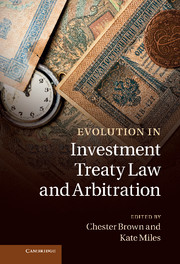Book contents
- Frontmatter
- Contents
- Contributors
- Editors' preface and acknowledgements
- Table of cases
- Table of Treaties
- Part I Introduction
- Part II Shifts in fundamental character
- 2 Conflict and conflicts in investment treaty arbitration: Ethical standards for counsel
- 3 Recent developments in the approach to identifying an ‘investment’ pursuant to Article 25(1) of the ICSID Convention
- 4 Investment treaty interpretation and customary investment law: Preliminary remarks
- 5 The public–private dualities of international investment law and arbitration
- 6 Outline of a normative framework for evaluating interpretations of investment treaty protections
- 7 Investment treaty arbitration as global administrative law: What this might mean in practice
- Part III Actors in international investment law
- Part IV The new significance of procedure
- Part V Engagement with cross-cutting issues
- Part VI Conclusions
- Index
- References
3 - Recent developments in the approach to identifying an ‘investment’ pursuant to Article 25(1) of the ICSID Convention
from Part II - Shifts in fundamental character
Published online by Cambridge University Press: 05 December 2011
- Frontmatter
- Contents
- Contributors
- Editors' preface and acknowledgements
- Table of cases
- Table of Treaties
- Part I Introduction
- Part II Shifts in fundamental character
- 2 Conflict and conflicts in investment treaty arbitration: Ethical standards for counsel
- 3 Recent developments in the approach to identifying an ‘investment’ pursuant to Article 25(1) of the ICSID Convention
- 4 Investment treaty interpretation and customary investment law: Preliminary remarks
- 5 The public–private dualities of international investment law and arbitration
- 6 Outline of a normative framework for evaluating interpretations of investment treaty protections
- 7 Investment treaty arbitration as global administrative law: What this might mean in practice
- Part III Actors in international investment law
- Part IV The new significance of procedure
- Part V Engagement with cross-cutting issues
- Part VI Conclusions
- Index
- References
Summary
Introduction
It is trite to say that:
The jurisdiction of the tribunal is fundamental to the authority and decision making of the arbitrators. Awards rendered without jurisdiction have no legitimacy. The absence of jurisdiction is one of the few recognized reasons for a court to set aside or refuse recognition and enforcement of an award.
The appealing possibility of a private investor litigating directly with a foreign State, the unique feature of the Convention for the Settlement of Investment Disputes between States and Nationals of other States (the ICSID Convention), was balanced by carefully defining the jurisdiction of the International Centre for Settlement of Investment Disputes (ICSID or the ‘Centre’). Article 25(1) of the ICSID Convention states that ‘the jurisdiction of the Centre shall extend to any legal dispute arising directly out of an investment’. The four requirements of subject matter jurisdiction, which were articulated in a similar form in Mihaly v. Sri Lanka, are, first, that there is a dispute; secondly that the dispute is of a legal nature; thirdly, that there is an investment; and finally, that the dispute arises directly out of that investment. This chapter focuses on the third requirement – that there is an ‘investment’.
- Type
- Chapter
- Information
- Evolution in Investment Treaty Law and Arbitration , pp. 42 - 64Publisher: Cambridge University PressPrint publication year: 2011
References
- 2
- Cited by

